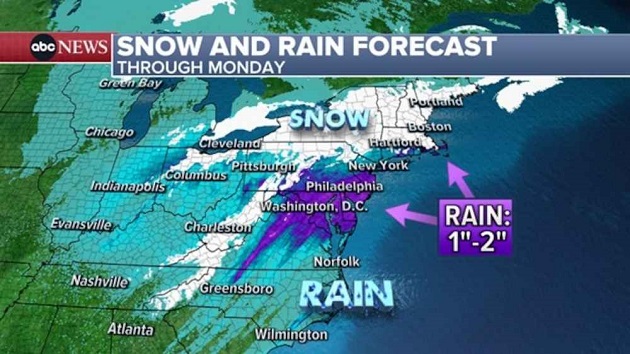(NEW YORK) — The eastern United States is being hit by severe weather this weekend, bringing flooding to the Southeast, rain in the mid-Atlantic and snow to the Northeast.
This weekend, 20 million Americans from Atlanta to Washington, D.C. are under flood watch as heavy rain, gusty winds and frequent lightning threaten the US Southwest.
After about two months of rain in recent days, parts of eastern Texas and Louisiana are still dealing with major river flooding.
The Trinity River just northeast of Houston is currently in Major Flood Stage – meaning significant to catastrophic, life-threatening flooding – and is forecast to remain above flood stage through at least Wednesday.
This overall storm system will take a turn up the East Coast, bringing rain and snow to a wide area. Rain and snow starts in the Northeast early Sunday, continuing in varying intensity through the day and into Sunday night.
The highest elevations of Pennsylvania, New York, Connecticut, Massachusetts, Vermont, New Hampshire and Maine will all get several inches of snow, with some places like Boston and Albany getting 6 to 12 inches. Meanwhile, smaller cities like Stanford and Erie are likely to see about 1 to 3 inches from now.
Lower elevations, including major cities along the I-95 corridor, such as New York City, will likely see some wet snow mixing with the precipitation, limiting snow accumulation.
The mid-Atlantic, including Philadelphia and Washington, D.C., is expected to receive 1 to 2 inches of rain as high temperatures hit the region.
Washington reached 80 degrees on Friday for the first time in the 152-year history of weather records. Previously, the record for the first 80-degree day was on February 21, 2018.
It wasn't the only city to reach a record temperature. Charleston, South Carolina, reached 83 degrees on Friday, breaking the previous record set for that day in 1949 and tying the city's record for January, according to NWS Charleston.
In addition, Wilmington, North Carolina also reached 83 degrees, breaking its all-time high since January, NWS Wilmington reported.
The west will also get some weather with an atmospheric river drenching the Pacific Northwest over the weekend.
An atmospheric river is a large, narrow area of atmosphere that carries water outside the tropics, according to the National Oceanic and Atmospheric Administration. When atmospheric rivers fall on land, the cascade can be either rain or snow, NOAA said.
The heaviest rainfall will likely be along the Washington and Oregon coasts, with several inches likely to cause scattered flooding.
Copyright © 2024, ABC Audio. All rights reserved.



